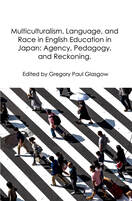Multiculturalism, Language, and Race in English Education in Japan: Agency, Pedagogy, and Reckoning
Edited by Gregory Paul Glasgow (Life and Education in Japan Series - Book 5)
https://doi.org/10.47908/26
Purchase ePub and PDF: PayHip
Ebook stores: Apple books | Google Play | Kindle | Rakuten/Kobo
Print: Amazon
Libraries and subscriptions: Everand | Libby/Overdrive | Perlego | Proquest
Ebook stores: Apple books | Google Play | Kindle | Rakuten/Kobo
Print: Amazon
Libraries and subscriptions: Everand | Libby/Overdrive | Perlego | Proquest

It is claimed that the English language teaching (ELT) profession incorporates principles of multiculturalism, tolerance, and pluralism, especially since it is viewed as a practical tool to promote intercultural exchange. However, as movements for social justice worldwide become more prevalent, some stakeholders in the field are beginning to question the field’s genuine commitment to such values. In Japan, for example, is the English language truly viewed as a practical communication tool to engage with diverse interlocutors on the global stage? Or do problematic discourses regarding the notion of the “ownership of English” and the ‘idealized speaker of English’ prevail due to the lingering dichotomy between so-called ‘non-native’ English-speaking teachers (NNESTs) and ‘native’ English-speaking teachers (NESTs) — a dichotomy that unfortunately intersects with views of ethnoracial and cultural difference, and which leads to discriminatory tendencies in pedagogical practices, educational cultures, and social structures?
The overall purpose of this volume is to initiate conversations about how issues surrounding language, race, and multiculturalism currently inform pedagogical practice in English Language Teaching (ELT) in Japan. We—the editor and contributors—intend to explore these issues with the hope that the experiences and pedagogical actions documented in this volume will motivate others to reflect on current challenges, raise appreciation for diversity in ELT, and dismantle inequities.
The overall purpose of this volume is to initiate conversations about how issues surrounding language, race, and multiculturalism currently inform pedagogical practice in English Language Teaching (ELT) in Japan. We—the editor and contributors—intend to explore these issues with the hope that the experiences and pedagogical actions documented in this volume will motivate others to reflect on current challenges, raise appreciation for diversity in ELT, and dismantle inequities.
Contents
- Foreword Towards an Onto-Epistemological View of Race. Nelson Flores
- Introduction to the Volume Gregory Paul Glasgow
- Chapter 1 Constrained Agency: Language, Race, and the Paradox of Multiculturalism in English Education in Japan. Gregory Paul Glasgow
- Chapter 2 Where Do I Fit in? The Effects of Native-Speakerism on Teacher Identity Formation. Tiina Matikainen
- Chapter 3 The “Half-Visible” Teacher: Experiences of a Hong Kong Canadian English Teacher in Japan. Jackson Koon Yat Lee
- Chapter 4 Rising from the Margin: Exercising Agency as a ‘Nonnative’ English-Speaking Teacher. May Kyaw Oo
- Chapter 5 Being a Filipino English Teacher in Japan: A Study of Identity and Agency. Marife Carpio & Alison Stewart
- Chapter 6 Case Studies of Two Japanese University Students’ Attitudinal Development and Language Use After ELF-Informed Instruction. Mayu Konakahara
- Chapter 7 In the Eye of the Beholder: Perceptions of Ideal English Teachers. Natasha Hashimoto
- Chapter 8 Outsider Teachers? Filipino Teachers’ Reflections on English Teaching and Raising Intercultural Awareness in Japan. Tricia Okada
- Chapter 9 Insider/Outsider Perspectives: Utilizing Educator Funds of Knowledge to Explore “Hidden Diversity” in University English Courses in Japan.
Aiko Minematsu & Jenny Morgan - Chapter 10 The Buried Grammar of Racial Injustice and the Pedagogical Practices for Unearthing It. Gordon Myskow
- Chapter 11 Blackness, Japan, and English as a Medium of Instruction: Teaching “Afro-Japanese Encounters” in the University. Warren Stanislaus
- Chapter 12 “Woke” Up: An Ongoing Journey of Teaching for Social Justice. Michael Ellis
- Chapter 13 Nurturing and Developing “Global Human Resources” for Internationalization in Japanese Higher Education: A University Lecturer’s Reflections. Mahboubeh Rakhshandehroo
- Chapter 14 Equity in ELT in Japan: Learning Through Transparency. Tanja McCandie, Eleanor Smith, Gretchen Clark, and Jamie Taylor
- Chapter 15 Teaching for Social Justice in Japan: A Sustainable Model. Gerry Yokota
- Conclusion Critical Multiculturalism in ELT in Japan: The Way Forward. Gregory Paul Glasgow
- Appendix List of Useful Acronyms and Japanese Terms
- Supplements and handouts
About the editor
Gregory Paul Glasgow holds a Ph.D. in Applied Linguistics from the University of Queensland, Australia, and he is currently an Associate Professor at Kanda University of International Studies in Chiba Prefecture. He co-edited the volumes Agency in Language Policy and Planning: Critical Inquiries and Researching Agency in Language Policy and Planning (with Jeremie Bouchard), published by Routledge. His research draws on critical applied linguistics and social theory to examine issues in language-in-education policy, language management, and the politics of Global Englishes in TESOL. Dr. Glasgow is also interested in second language teacher education (SLTE), and ELT practices that promote multiculturalism, equity, intercultural awareness, and social justice.
Praise for Multiculturalism, Language, and Race in English Education in Japan: Agency, Pedagogy, and Reckoning
"Multiculturalism, Language, and Race in English Education in Japan is an excellent model for scholars and educators looking to develop similar projects that seek to adopt a raciolinguistic perspective in contexts outside of the Euro-American geopolitical center. It manages to balance providing practical advice to English language teachers working in Japan with more general theoretical work that helps those of us not as familiar with this context to identify possible synergies with research and teaching in other contexts. My hope is that work like this continues to emerge in the coming years in ways that help us all to better understand the global power of race in modern/colonial worldmaking. My hope is that we also continue to identify alternative worlds that are not completely determined and are sometimes in resistance to this modern/colonial worldmaking in our local contexts. These efforts should be continued in order to develop new forms of global solidarity in applied linguistics that have connections to broader abolitionist movements formed to dismantle white supremacy and construct new socially just and inclusive futures" (Foreword, pp. 4-5).
Nelson Flores, University of Pennsylvania Graduate School of Education, USA.
“If one looks for a book that conceptualizes, theorizes and explains complex issues of language and race in the field of English language teaching in a highly engaging, reader-friendly, balanced, inclusive, practice-oriented and aware manner, this is definitely one. These strengths are communicated with grace, humility, down-to-earth standpoints and thorough dialogues with theories and change. The editor and all the contributing authors have taken readers to many social, professional, and educational contexts and ELT classrooms in Japan where subtle, covert, and overt events and interactions convince us of the need to address and be more vocal about race, language and social justice matters that are globally relevant. Making wonderful use of autoethnography, narrative inquiry and multiple forms of qualitative data, this collection creates an exemplary model for transforming pedagogy and practice through centering teachers’ everyday life experience, reflections, and desires to make change and educate.”
Phan Le Ha, Universiti Brunei Darussalam, Brunei
“This book elevates discussion of ‘native-speakerism’ in TESOL to another level and invites us to examine racism, white privilege and their intersectionality with other forms of diversity/ oppression, such as gender and sexuality, in the Japanese context. The contributors, English language teachers with diverse backgrounds, illuminate the interactive process whereby both educators and Japanese students exercise agency in learning about race and multiculturalism, by depicting their practices and self-reflexive observations. The authentic descriptions of such dynamic processes occurring in classrooms and the book’s raciolinguistic perspective would be of interest to anyone studying racism, language education and multiculturalism.”
Professor Kaori H. Okano, La Trobe University, Melbourne, Australia
“Multiculturalism, Language, and Race in English Education in Japan: Agency, Pedagogy, and Reckoning is an excellent collection of chapters by scholars examining race, language, and multiculturalism in the context of Japan’s English Language Teaching (ELT). It’s an informative and well-laid piece that focuses on the identities and experiences of a diverse group of ELT professionals living in Japan, giving research insights and teaching strategies for promoting social justice and equality, and offering practical examples and future trajectories for fostering pluralist and anti-racist views in and beyond the classroom.This is a must-read book for anyone interested in teaching/learning English in Japan and pursuing a just society through the ELT profession.”
Mieko Yamada, Professor of Sociology, Purdue University Fort Wayne, USA
Nelson Flores, University of Pennsylvania Graduate School of Education, USA.
“If one looks for a book that conceptualizes, theorizes and explains complex issues of language and race in the field of English language teaching in a highly engaging, reader-friendly, balanced, inclusive, practice-oriented and aware manner, this is definitely one. These strengths are communicated with grace, humility, down-to-earth standpoints and thorough dialogues with theories and change. The editor and all the contributing authors have taken readers to many social, professional, and educational contexts and ELT classrooms in Japan where subtle, covert, and overt events and interactions convince us of the need to address and be more vocal about race, language and social justice matters that are globally relevant. Making wonderful use of autoethnography, narrative inquiry and multiple forms of qualitative data, this collection creates an exemplary model for transforming pedagogy and practice through centering teachers’ everyday life experience, reflections, and desires to make change and educate.”
Phan Le Ha, Universiti Brunei Darussalam, Brunei
“This book elevates discussion of ‘native-speakerism’ in TESOL to another level and invites us to examine racism, white privilege and their intersectionality with other forms of diversity/ oppression, such as gender and sexuality, in the Japanese context. The contributors, English language teachers with diverse backgrounds, illuminate the interactive process whereby both educators and Japanese students exercise agency in learning about race and multiculturalism, by depicting their practices and self-reflexive observations. The authentic descriptions of such dynamic processes occurring in classrooms and the book’s raciolinguistic perspective would be of interest to anyone studying racism, language education and multiculturalism.”
Professor Kaori H. Okano, La Trobe University, Melbourne, Australia
“Multiculturalism, Language, and Race in English Education in Japan: Agency, Pedagogy, and Reckoning is an excellent collection of chapters by scholars examining race, language, and multiculturalism in the context of Japan’s English Language Teaching (ELT). It’s an informative and well-laid piece that focuses on the identities and experiences of a diverse group of ELT professionals living in Japan, giving research insights and teaching strategies for promoting social justice and equality, and offering practical examples and future trajectories for fostering pluralist and anti-racist views in and beyond the classroom.This is a must-read book for anyone interested in teaching/learning English in Japan and pursuing a just society through the ELT profession.”
Mieko Yamada, Professor of Sociology, Purdue University Fort Wayne, USA
Publication details
Publication date: March 2023
ISBN: 9798378656561 (print)
ISBN: 9798215449554 (ebook)
DOI: https://doi.org/10.47908/26
Ebook, $9.99 [Available from Smashwords, Amazon Kindle, Apple, Kobo and other ebook stores]
Print book, 410 pages, $29.99 [Available from Amazon and other online booksellers]
Series: Life and Education in Japan (Book 5)
Series editors: Diane Hawley Nagatomo and Melodie Cook
ISBN: 9798378656561 (print)
ISBN: 9798215449554 (ebook)
DOI: https://doi.org/10.47908/26
Ebook, $9.99 [Available from Smashwords, Amazon Kindle, Apple, Kobo and other ebook stores]
Print book, 410 pages, $29.99 [Available from Amazon and other online booksellers]
Series: Life and Education in Japan (Book 5)
Series editors: Diane Hawley Nagatomo and Melodie Cook
